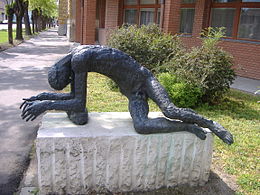This article may be too technical for most readers to understand. (March 2019) |

Sleep is a naturally recurring state of mind and body, characterized by altered consciousness, relatively inhibited sensory activity, reduced muscle activity, and inhibition of nearly all voluntary muscles during rapid eye movement (REM) sleep,[1] and reduced interactions with surroundings.[2] An essential aspect of sleep is that it provides the human body with a period of reduced functioning that allows for the systems throughout the body to be repaired. This time allows for the body to recharge and return to a phase of optimal functioning. It is recommended that adults get 7 to 9 hours of sleep each night. Sleep is regulated by an internal process known as the circadian rhythm. This 24-hour cycle regulates periods of alertness and tiredness that an individual experiences.[3] The correlation between psychological stress and sleep is complex and not fully understood.[4] In fact, many studies have found a bidirectional relationship between stress and sleep. This means that sleep quality can affect stress levels, and stress levels can affect sleep quality. Sleep change depends on the type of stressor, sleep perception, related psychiatric conditions, environmental factors, and physiological limits.[5][6][4][7]
- ^ Ferri, R.; Manconi, M.; Plazzi, G.; Bruni, O.; Vandi, S.; Montagna, P.; Zucconi, M. (2008). "A quantitative statistical analysis of the submentalis muscle EMG amplitude during sleep in normal controls and patients with REM sleep behavior disorder". Journal of Sleep Research. 17 (1): 89–100. doi:10.1111/j.1365-2869.2008.00631.x. PMID 18275559.
- ^ "Brain Basics: Understanding Sleep". Office of Communications and Public Liaison, National Institute of Neurological Disorders and Stroke, US National Institutes of Health, Bethesda, MD. 2017. Archived from the original on 11 October 2007. Retrieved 10 December 2013.
- ^ American Psychological Association. "Stress and Sleep". American Psychological Association. Retrieved 6 December 2021.
- ^ a b Araki, Hiroaki; Suemaru, Katsuya; Li, Bingjin; Cui, Ranji (2008-03-01). "Psychological Stress-induced Changes in Sleep Patterns and Its Generation Mechanism". Yakugaku Zasshi. 128 (3): 405–411. doi:10.1248/yakushi.128.405. ISSN 0031-6903. PMID 18311060.
- ^ Schumacher, Sarah; Niemeyer, Helen; Engel, Sinha; Cwik, Jan Christopher; Knaevelsrud, Christine (2018-12-01). "Psychotherapeutic treatment and HPA axis regulation in posttraumatic stress disorder: A systematic review and meta-analysis". Psychoneuroendocrinology. 98: 186–201. doi:10.1016/j.psyneuen.2018.08.006. ISSN 0306-4530. PMID 30193225. S2CID 52172992.
- ^ Rezaie, Leeba; Fobian, Aaron D.; McCall, William Vaughn; Khazaie, Habibolah (2018-08-01). "Paradoxical insomnia and subjective–objective sleep discrepancy: A review". Sleep Medicine Reviews. 40: 196–202. doi:10.1016/j.smrv.2018.01.002. ISSN 1087-0792. PMID 29402512. S2CID 46765273.
- ^ Cite error: The named reference
:5was invoked but never defined (see the help page).